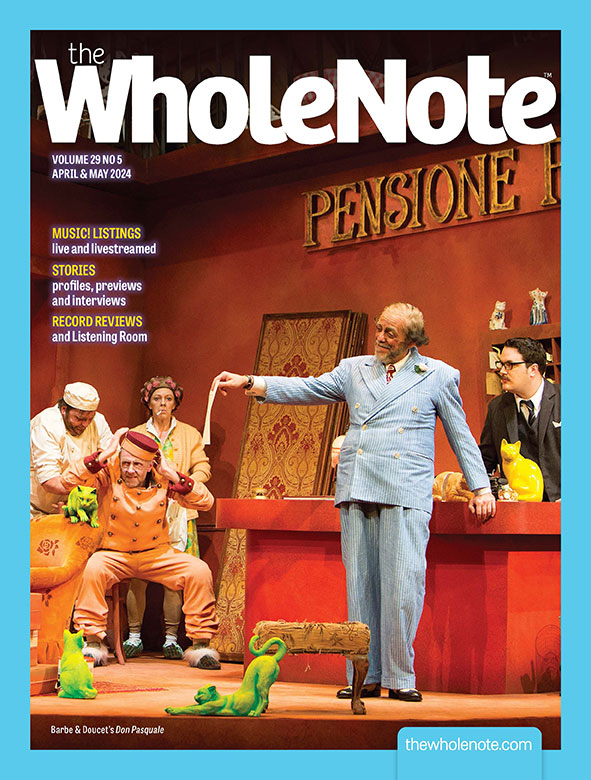I always have a funny moment of pleasure when one of our columnists finds himself or herself having to preface a reference to a particular upcoming event with a disclaimer – calling readers’ attention to the fact that the columnist in question is actually performing in the event they’re about to tell you about. (See the final paragraphs of Ben Stein’s and Ori Dagan’s columns in this issue for examples of what I am talking about.)
It doesn’t happen often, but often enough. And the pleasure that I get from it, every time, is the little reminder that so many of our writers are, in fact, active participants in the musical “Beats” they write about, rather than detached observers.
I also get some satisfaction, in those situations, from the fact that we still make the effort to point these little conflicts of interest out to our readers when they happen. It gets harder and harder when all the protocols they teach in publishing courses about keeping one’s editorial operations as pure as the driven snow are being blown away by the winds of digital change. It’s especially hard for the little guys like us to stick to protocols for keeping editorial and advertising separate at a time when even the big guys who passed exams in the rules are floundering for consistency.
So what am I driving at? Well, just this: this is one of those times when I am busting to use this supposedly sacred bit of editorial real estate to tell you about a whole bunch of things I would not even know about if I were wearing only my editorial hat instead of the two or three that every member of this tiny organization must juggle just to keep this little publication going.
So, damn the torpedoes! Here I go! (I can always go back to being an editorial virgin in the morning, can’t I?)
One: Azrieli
Were you in too much of a hurry to come visit me here to notice the advertisement from the Azrieli Foundation on page 4, announcing the Azrieli Music Project ? The competition announced in the ad should make the composers among you sit up and take notice, at any rate. It offers a $50,000 prize for a 15 to 25 minute newly composed work of “orchestral Jewish music,” by a Canadian resident; to be performed in a gala concert by Kent Nagano and the Montreal Symphony Orchestra.
The question that jumped up at me immediately was “So, what constitutes ‘Jewish music,’ in these times?” To their credit, the AMP doesn’t duck the question. “The question What is Jewish Music? is at the heart of a constantly evolving cultural dialogue,” they say. “Taking into account the rich and diverse history of Jewish musical traditions, the AMP defines ‘Jewish Music’ as music that incorporates a Jewish thematic or Jewish musical influence. … Defining Jewish music as both deeply rooted in history and tradition and forward-moving and dynamic, the AMP … challenges orchestral composers of all faiths, backgrounds and affiliations to engage creatively and critically with this question in submitting their work.”
Consider the following: in this month’s WholeNote listings there is a concert on March 12, jointly presented by the Ashkenaz Foundation and the Aga Khan Museum, titled “Spotlight on Israeli Culture” and featuring the Diwan Saz Interfaith Ensemble – a multicultural ensemble of Jewish, Muslim, Christian and Bedouin musicians performing “ancient music from Central Asia, Turkey, Persia and the Holy Land.” And two days later, on March 14, the Music Gallery, Ashkenaz Foundation and Koffler Centre for the Arts combine to present a work called The Lanka Suite by Tova Kardonne which, according to columnist Andrew Timar, “goes back to the Klezmer bands Kardonne played in, starting in her teens, as well as to her grandparents’ Eastern European Jewish roots” and goes on from there to engage with the social realities of post-civil war Sri Lanka, taking in, along the way, Kardonne’s “studies of Cuban santería batá drumming, North and South Indian drumming patterns, and her participation in the Brazilian Samba Elégua group.”
With these kinds of dialogue under way in our town, it will be fascinating to see who rises to the AMP challenge. We will follow the story as it develops.
Two: IRCPA
Still on the subject of ads in the issue, please take a look at the one on page 28 for IRCPA (International Resource Centre for Performing Artists) for their series of workshops, March 27 to 29 and then April 10 to 12. Ann Summers Dossena, driving force behind IRCPA, has been preaching in the arts wilderness for as long as I can remember about the unmet needs of artists on the edge of performing careers who have nowhere to turn for support, resources and expertise when they are in the process of making the transition from a sheltered academic environment to the realities of life as working musicians. Now finally, it seems people who should have been listening long ago are starting to listen.
I’m proud to say The WholeNote is sponsoring the third of the March sessions (Sunday March 29) right here at the Centre for Social Innovation, 720 Bathurst Street. The first five of you who respond to publisher@thewholenote.com saying you read this can be my guests at the Sunday session!
Three: March for Music Therapy; MusiCounts
And still on the subject of ads, I have two more you should go and look at. First go check out the March for Music Therapy ad on page 77. It’s another example of how music can send out tendrils of re-engagement with community life and living.
And while you’re splashing around the back of the magazine, pop over to page 56 where you’ll find under “Opportunities” in our splendid revamped Classified advertising section the following all-too-easy-to miss announcement about the MusiCounts TD Community program - one of the most unequivocally useful bits of corporate sponsorship I can think of. “SUBMISSIONS ARE NOW BEING ACCEPTED” it says “for the 2015 MusiCounts TD Community Music Program, which provides access to musical instruments and equipment to thousands of children in under-served Canadian communities. The grants will be distributed in allotments of up to $25,000 totalling $220,000. Grant applications are now being accepted at www.musicounts.ca, with a submission deadline of Friday, May 8, 2015.”
And finally:
This issue heralds the beginning, in terms of coverage, of our long slow walz towards the summer, in the form of Part One of our coverage of Summer Music Education. In Sara Constant’s story “All Roads Lead to Summmer” that introduces the directory (page 12) there is the comment that those seeking summer music education, no matter how different, are all looking for “options that foster the ... spirit of learning and community.”
Amen to that. All year round.
publisher@thewholenote.com




